
Experts are predicting a summer of travel chaos. Here's why
Or is it? While you may have got all your ducks in a row, the same can't be said for all of the travel industry. Not only are there ever-changing rules on testing, vaccines and quarantines to abide by when traveling; but once you've sorted your side out, getting to your destination looks set to be fraught with difficulty.
Top of the chaos board? Aviation. The industry was, of course, decimated by the pandemic -- but many airlines and airports currently seem unable to cope with travel's resurgence.
Countries on both sides of the Atlantic are seeing a slew of canceled flights due to lack of crew, long lines at airports thanks to understaffing, and the kind of rates for rental cars that make buying a vehicle look cheap. That's, in part, because everyone has the same idea as you -- only this week, Delta Air Lines CEO Ed Bastian announced that March 2022 had been the carrier's best month for sales in its history.
Facing unprecedented demand, the much-reduced industry is struggling to cope.
In the US, things have been brewing for the past year, as domestic travel has taken off again. Meanwhile in UK, the chaos at major airports has made the news every day for the past couple of weeks, and seen the national carrier, British Airways, reported to the industry regulator for potential law-breaking.
The flying experience may be smoother elsewhere in Europe, but car rentals are not. A bubble car can set you back more than your hotel -- and that's before you factor in rocketing gas prices. Traveling within the US? That "carmageddon" is hitting just as hard.
Welcome to a summer of chaos? Let's hope not -- but industry figures rather fear it will be.
A hot mess summer
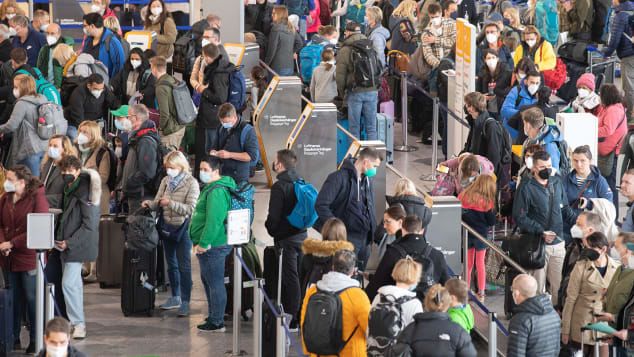 Snaking queues in Frankfurt airport.
Snaking queues in Frankfurt airport.
"I think it's a preview of things to come -- and I do think things are going to get worse," says consumer advocate Christopher Elliott, who's been monitoring the situation in the US and Europe.
"The summer will be chaos," he believes -- so much so that he's advising his followers to avoid Europe in August, the peak of the peak season.
That airline chaos? He lays it squarely at the door of the airlines.
"I think we've been seeing some delays related to the pandemic, but I think they're baked into the equation at this point -- I don't think that's really a legitimate excuse," he says.
"It's everyone's fault except their own. If they took a good look in the mirror they'd realize that during the pandemic they downsized and laid staff off, and now demand has come surging back and they're caught off guard. They haven't been able to staff up fast enough to meet demand."
Elliott -- the founder of non-profit Elliott Advocacy -- has little time for the oft-quoted "technical issues," either.
"Airlines in the US use antiquated legacy systems in desperate need of update. They haven't upgraded as they should have. When they crash they lead to massive cancellations," he says.
On the opposite side of the pond, technical issues -- which have been blamed for mass cancellations in the US since last year -- have also plagued by British Airways, the UK flag carrier.
On February 26, a "systems disruption" saw the airline ground all shorthaul flights. It was the second IT failure in 10 days, and followed similar issues in 2017 and 2018.
But that was the least of the UK's problems. Since then, hundreds of thousands of travelers have seen their flights delayed or canceled, or have simply missed them thanks to the chaos engulfing some major UK airports.
Heathrow and Manchester airports have rarely been out of the news since the end of March, with severe staff shortages creating hours-long lines at check-in, security and passport control.
And the lack of staff also means that people are waiting hours for their baggage to arrive.
(Aviation) anarchy in the UK
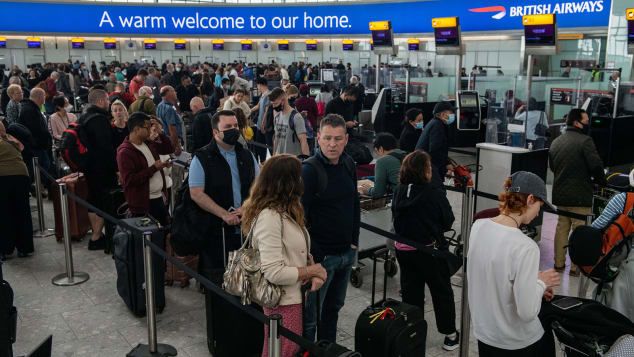 British Airways' hub at Heathrow Terminal 5 has been particularly hit.
British Airways' hub at Heathrow Terminal 5 has been particularly hit.
Photos of snaking lines and piles of baggage -- often abandoned, after customers get tired of waiting for hours -- have dominated the UK press.
And the chaos is only getting worse. Stansted airport, budget carrier Ryanair's hub outside London, on Thursday advised passengers traveling for the Easter break to drop their luggage off a full 24 hours before their flight.
Ryanair at least isn't canceling flights. The two airlines doing that in the UK currently are easyJet and British Airways. Both have been suffering unprecedented staff shortages since the end of the month, leading to dozens of flight cancellations every day. It may or may not be a coincidence that both also ditched their onboard mask requirements in mid-March.
Enrico Ferro, from Padua, Italy, flew to London with British Airways for a four-day vacation with his wife and child on March 30. On arrival, they spent three hours waiting for their luggage to arrive at Heathrow.
"We spent the first day of our holiday in the airport," he tells CNN.
Things got worse on the way back. Their return flight to Venice was canceled when they were already at the gate. They ended up on a flight to Bologna, arriving at midnight. Ferro's father had to go collect their car from Venice airport, and drive two hours to pick them up and get them home in the early hours of the morning.
Ferro says BA staff never informed him that he was due compensation. He says he will "never" fly the airline again.
"I chose BA instead of low-cost companies because I was sure that services for travelers was better," he says. "I found out that this is no longer the case."
On April 14, UK consumer organisation Which? wrote to the Civil Aviation Authority, saying they had evidence from customers that BA was not informing them of their rights regarding cancellations and delayed flights. Rory Boland, editor of Which? Travel, said in a statement: "Our investigation found British
Airways neglected to tell passengers about their right to compensation and left families significantly out of pocket by failing to reroute them."
British Airways did not respond to a request for comment from CNN, but told Which? Travel in a statement: "We always meet our legal obligations."
Boland told CNN that the current chaos in the UK is, he thinks, "worse than in many other countries."
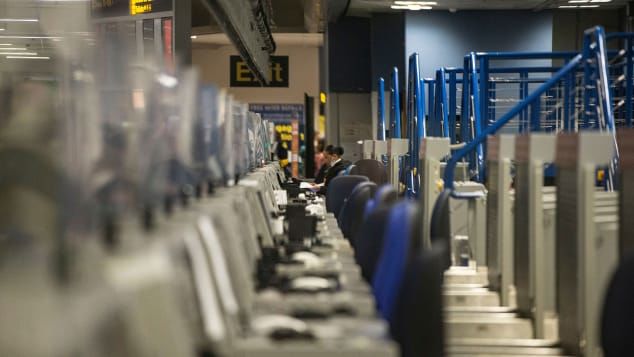 Understaffing has led to scenes like this in the UK, where one easyJet
check in agent is on duty as thousands of passengers queue in
Manchester.
Understaffing has led to scenes like this in the UK, where one easyJet
check in agent is on duty as thousands of passengers queue in
Manchester.
"There's a longer term problem around staff employment, and that's difficult to overcome -- especially for travel businesses who pay low wages.
"I've been in touch with some [aviation workers] who were fired during the pandemic. They've been offered to come back under worse pay and worse conditions, and they're saying, 'I don't really want to -- I've got a better job.' Unless airports and airlines increase their offer, they'll take a long time to increase staff."
Brexit is, of course, a famously divisive topic in the UK, with many who opposed it ascribing the country's current problems to the UK's exit from the EU.
But when it comes to the current airport chaos, there's a tangible link, says Kully Sandhu, managing director of Aviation Recruitment Network, which finds staff for the industry in the UK.
"We used to receive 50% to 60% of our applications from EU nationals for our London airport roles," he says.
"Not having this European workforce has not only has caused problems with recruitment, but it also means that airports have fewer employees who are able to speak a European language. This was a major benefit and not having that facility can impact the time it takes passengers to get through an airport."
Sandhu also blames yo-yoing travel restrictions which led to employers using staff on an "as and when needed" basis rather than giving them regular work -- leading to more and more leaving the industry.
In a nutshell? "Airport staff found more stable and financially lucrative opportunities and have decided not to return to work in such a volatile market," he says.
Sandhu predicts that it will take "up to 12 months" for airport staffing levels to return to pre-pandemic levels in the UK.
Meanwhile, Lucy Moreton, general secretary of Immigration Services Union (ISU), told the BBC that Border Force -- which checks people coming into the UK -- is "catastrophically understaffed." The government has blamed problems on the surge in travelers over Easter.
With reports of physical fights breaking out, passengers passing out in queues and thousands of travelers having their flights canceled every day, many will decide to put that post-pandemic trip to London on ice.
Meanwhile, in America
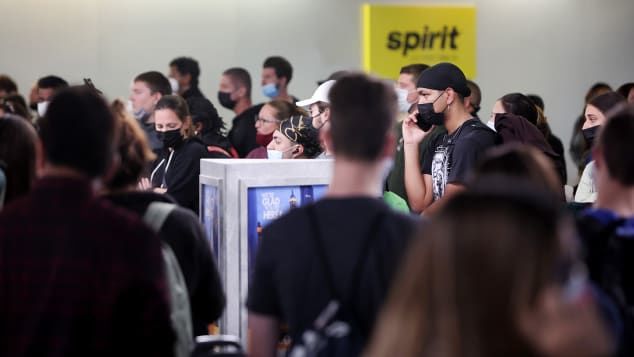 Spirit and JetBlue were badly hit last week.
Spirit and JetBlue were badly hit last week.
Not everyone is so downbeat. We need to keep perspective, says Courtney Miller, managing director of analysis at The Air Current.
For starters, he says, after two months of restrictions "We can get out and fly."
But he admits that, particularly in the US, the experience "sucks -- it's more expensive, and more wrought with the chance of being delayed or canceled."
The problem is? "Things are great -- too great -- and we're struggling to catch up."
Miller says that the sudden rebound of the domestic US market last summer saw demand as high as 70% of pre-pandemic levels -- and airlines simply didn't have the infrastructure to respond. "We had various airlines go through meltdown," he says, adding that over 5,000 pilots left (or were asked to leave) the industry in 2020, and new ones aren't coming through fast enough.
While demand plateaued during the Omicron outbreak, it's now back with a vengeance -- at around 90% of 2019 levels, he says -- and airlines simply can't keep up.
"We're seeing mass cancelations again, and airlines are reducing schedules. Fares are through the roof, and people like to talk about [the price of] oil but that's not why. The problem is we have more people wanting to fly than we have seats," he says.
Miller has more sympathy -- or, perhaps, understanding -- for the airlines than most. We need to realize the magnitude of what they have been through, he says: "98% of their business disintegrated." By comparison, the long-talked-of devastation wreaked on aviation by 9/11? It reduced the industry by a mere 10%.
When an industry is down to the bones, he says, an unexpected problem -- like the storms in Florida last weekend, which saw JetBlue and Spirit ground flights -- "really hits."
US airlines are now reducing their summer schedules -- in other words, canceling flights -- in a bid to improve the problem. That's why Miller recommends booking as soon as possible, so that you're already in the system if cuts come.
"If they cancel my flight, they have to find me a new flight; if I wait, the risk is on me," he says.
"Just book now."
Not in the US and feeling smug? Bad news: he says America is about a year ahead of other western travel industries.
"We can look at western economies and say we expect a similar magnitude as we go into peak season," he says.
"European markets haven't yet gone through that extreme shortage, but this summer is going to be very, very telling as passengers return."
'I wanted to rent the car, not buy it'
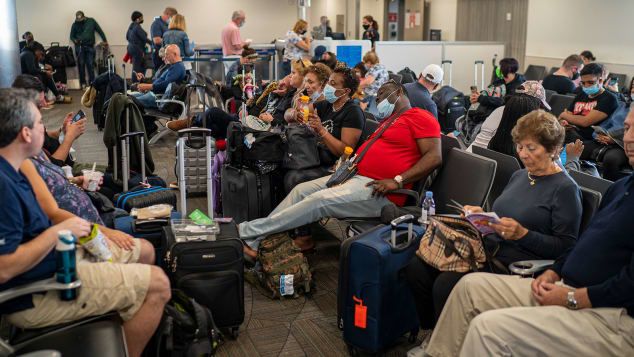 Americans are ready to travel again, says Kerby.
Americans are ready to travel again, says Kerby.
Because passengers are returning, despite the chaos.
"I think it's endemic to the human spirit to go out and see things," says Zane Kerby, president of the American Society of Travel Advisors.
He should know -- he was quarantined for five days in the Caribbean last year, sharing a room with his kids as they listened to people having the time of their lives outside. And on March 31 he spent two hours queuing to check in for his British Airways flight from Heathrow.
He thinks that it'll take "months, not weeks" to have things running smoother. And yet, all he wants to do is get on the road again.
For Kerby, the main sticking point is the non-uniform way in which travel restrictions are being imposed and lifted around the globe -- and, in particular, the requirement to test before returning to the US, which he says is causing psychological chaos, and putting people off travel.
For those who conquer that barrier, he says that now's the time to book via a travel adviser.
"The landscape is changing all the time, rules and requirements too. You need someone not only looking out for you, but who can anticipate things that can go wrong, and help get you rebooked and find accommodation if they do go wrong -- particularly for international trips," he says.
He warns that booking your flight isn't enough this year, and flags the rental car situation as another major pinch point.
"It could be worse than last year," he warns. "There are popular destinations in the US -- Honolulu, LA, South Florida -- where prices have spiked to unbelievable levels."
Last year, he was quoted $3,200 for a week's rental in Hawaii.
"I didn't want to buy the car, just rent it," he says.
We need to talk about rental cars
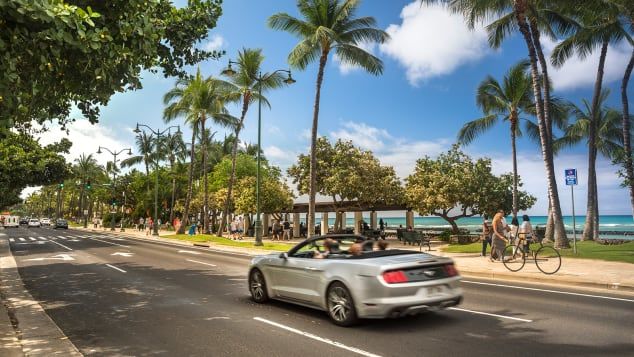 Kerby was recently quoted $3,000 for a week's car rental in Hawaii.
Kerby was recently quoted $3,000 for a week's car rental in Hawaii.
So you've arrived at your destination. You're in luck -- your bags have arrived, too. But it's not over -- now there's the gauntlet of the rental cars to run.
The "carmageddon" of 2021 -- sky high prices caused by intense demand and not enough cars -- has not been resolved. The supply chain crisis still means a global shortage of new cars being manufactured -- which means rental companies are still struggling to fill their fleets.
Plus, there's still nervousness around the pandemic, says Phil Partridge of brokers Rhino Car Hire.
"Car rental agents remain hesitant to fully restock fleets in fear of another variant wreaking havoc through the travel industry," he says.
"That alongside the physical limitations on how many cars they can procure to restock the fleets... it's essentially a supply and demand situation again where demand is outstripping supply which inevitably leads to price hikes."
It didn't used to be like this -- high availability meant that car hire prices rarely saw the same holiday hikes as flights. But consider this the new normal -- at least, for now.
There may be some hope. Members of staff at one major Italian rental company informally told CNN Travel this week that prices should dip after Easter before rocketing again in late June, and Partridge agrees.
"Outside the school holidays we expect prices to drop, albeit not to pre-pandemic levels," he says.
So how to beat the system? Partridge suggests searching for "off-airport" -- a downtown or railway station location might be significantly cheaper, even after deducting the taxi you might take to get there.
Most importantly? Reserve your car as early as possible, everyone agrees. Partridge says that he suggests booking 8-24 weeks in advance for the best deals.
"Secure a car at the earliest opportunity and check rates periodically leading up to your rental," he advises.
"You can always cancel and rebook at a lower rate if prices drop, but can't turn back the clock and book the rate you saw months prior."
Booking an electric car will save on fuel money when costs are at an all time high, he suggests -- and check for any employee discounts that you may be eligible for via your job.
'We have the infrastructure, but it'll take time'
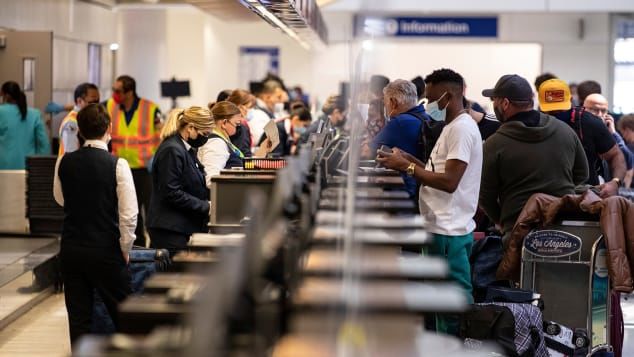 Remember that airline staff are badly paid and work long hours.
Remember that airline staff are badly paid and work long hours.
When you're facing travel chaos, just remember that the people facing you are likely badly paid, and will have given up the 9 to 5 to work in this industry.
"Working in travel often means working antisocial hours, especially in an airport," says George Morgan-Grenville, founder of luxury tour operator Red Savannah, which has gone from a "catastrophic" pandemic to the best year they've ever had.
For him, as for Boland, aviation needs to offer better conditions. "You've got to make the conditions attractive enough that people can live a good family life, earn a decent wage and do the job."
But he, more than the others, has hope that things will recover.
"Everyone who didn't travel in the pandemic now wants to, we've gone from zero to 60 in months," he says.
"For any business, dealing with that increase is going to be testing.
"We did have the capability -- world class airports and infrastructure. But it'll take time, and the airports are going to need to make the jobs very attractive."
He also thinks we may be pleasantly surprised as the weather improves and Covid infections predictably drop. Decreasing rates won't bring in new staff, of course, but they will help the record staff sickness levels.
How to handle the travel chaos
So what should we be doing to give ourselves the best chance of skipping the chaos?
Book early, all our experts agree. But there's more:
• Know your rights
In the US, if an airline cancels your flight, it's obliged to find another way of getting you to your destination -- although there's no time limit on when that should be.
In the EU and UK (which copied and pasted the travel EU law after Brexit), airlines must reroute passengers to their final destination "at the earliest opportunity." That means they must book you on a rival airline (or train, or other form of transport) if they cannot accommodate you themselves. Although, if they can get you there the same day themselves, they may go for that option -- even if it's a much later flight.
If you are stranded overnight, the airline must pay for a hotel room for you, as well as meals for delays. You can also claim for ground transportation, if you are flown to a different destination.
If your flight was canceled with less than two weeks' notice, they must also pay you compensation of between €250-600 ($270-$649), depending on the flight distance.
These rules apply to any flights leaving or going into the EU or UK. Do not cancel your booking, or your claim will be invalid.
• Book a car through a broker
Boland says that their research at Which? Travel shows that it's "much cheaper to book through a broker." Make sure it's one that includes small, independent car rental businesses as they're likely to be the best value this year. He suggests Zest.
• Choose your airline wisely
Miller says that most US airlines are struggling at the moment, but when it comes to Europe, as Boland says, the likes of Ryanair, Wizz and Jet2 aren't canceling flights. British Airways and easyJet are.
• Fly midweek
While the US leisure market is on fire, Miller says, business travel hasn't quite caught up -- though it's getting there. That means that for the moment, fares are still lower midweek.
You may find less chaos, too -- Grenville-Morgan "whizzed through" Heathrow on a Tuesday-to-Thursday trip to Italy last week. "It couldn't have been simpler," he says.
• Book through an expert
This is one time when it's not a great idea to DIY. Having a third party take care on your booking takes the stress off. They'll know what the entry regulations are for your destination, which hotels are available, and if your flight is canceled, they can rebook you while everyone else stands in a 200-deep line at the gate.
"People work 50 weeks a year so they can go somewhere," says Kerby. "Booking with a travel adviser allows you to sit back and enjoy your vacation rather than worrying about the details that can make life miserable."
• Go for a hotel, not a rental
Boland says that while private rental prices have rocketed, hotel rates are holding for now -- in fact, in some places they're till at reduced rates, since people are preferring to stay in rentals.
• Be flexible
There are still bargains out there, says Boland -- but you'll need to be unfussy to grab them. Just want some sun or a city break -- any city break? You'll be in luck. On the other hand, if you're set on dates or destination, book asap.
• Pick a nation of domestic tourists
Morgan-Grenville reckons that one of the reasons the UK has been so badly hit is that it's a nation of inveterate travelers.
"In a typical year you've got 18 million Brits traveling to Spain, 12 million to France and four million to Italy -- much more than the equivalent European nations going out to visit each other's countries or the UK."
That means the chaos factor is high. You may find it easier to pick a country such as France or Italy, where the locals largely stay domestic for the holidays.
• Plan ahead
Morgan-Grenville says that hotels have redeployed staff to cover shortages, so you might find that restaurant closed, or closing early. That goes for the outside world, too -- this year, like no other, you need to plan and book ahead.










